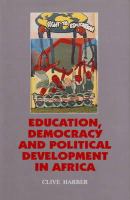
Education, Democracy and Political Development in Africa
- List Price: $49.50
- Binding: Hardcover
- Publisher: Sussex Academic Press
- Publish date: 06/01/1997
There is a widespread fear, nevertheless, that the democratic reform of political institutions may not last after the first round of internationally sponsored or supervised elections. The pressing issue therefore is how to make democracy sustainable on the African continent in the longer run? This book looks at the role of one key social institution in this process -- formal schooling. Schooling should enhance the democratic skills, values and behaviors necessary to sustain democratic political institutions. This book argues, with supporting evidence from a wide range of African countries, that currently schools are an obstacle to education for democracy. However, there are encouraging signs and examples from certain African countries which suggest that the importance of education for democracy has been recognized.
From the chapter "Politics, Education and Democracy in the African Context": This book is concerned with the role played by education in helping to shape and sustain political systems in Africa. The book focuses primarily on formal education and its place in socializing young people into the political norms, values, attitudes and behaviors of democracy on the one hand and authoritarianism on the other. That there is a relationship between education and the nature of the political system was pointed out twenty-fivecenturies ago by the Greek philosopher Aristotle:
But of all the safeguards that we hear spoken of as helping to maintain constitutional continuity the most important, but most neglected today, is education, that is educating citizens for the way of living that belongs to the constitution in each case. It is useless to have the most beneficial of rules of society fully agreed on by all who are members of the polity if individuals are not going to be trained and have their habits formed for that polity, that is to live democratically if the laws of society are democratic, oligarchically if they are oligarchic.
This quotation underlines the key point that both democracy and authoritarianism are socially learned behaviors, they are not genetically inherited. However, this book is not as even-handed as Aristotle about the choice between oligarchy and democracy as it has a clear preference for the latter as a goal of political development because, though not necessarily easy to achieve, democracy provides the only political model which in the long run can provide the peaceful context for development that Africa so badly needs.
This book aims to provide a political analysis of education in Africa within the context of democratization.

